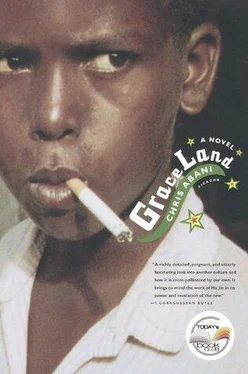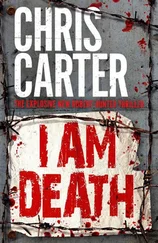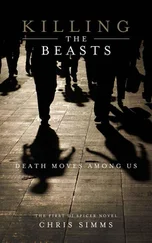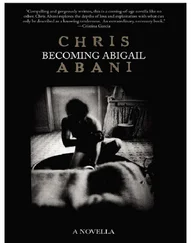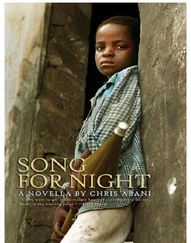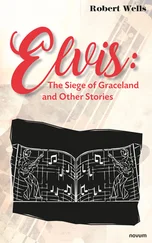“Speak,” a voice urged.
He stared. It sounded familiar, but its owner stood in the shadows.
“Stupid boy. Do you think anybody cares whether you live or die? Confess and save yourself.”
His vision cleared and he realized it was the Colonel.
“Why won’t you confess?” the Colonel asked.
Elvis opened his mouth to speak, but his tongue, the size of a thick slice of watermelon, kept getting in the way.
“Beat him some more, Jerome. He is too stubborn,” the Colonel said to someone in the shadows.
Elvis noticed for the first time that he was naked and began to struggle against his chains. He saw a stocky man stripped to the waist step out of the shadows, face heavily scarified. He smiled with a mixture of contempt and pleasure at Elvis’s squirming.
“I never touch you and you dey cry. Today I go show you pepper,” Jerome said.
He walked over to the wall and selected a koboko, the whip about four feet long. He came over to Elvis and showed him the whip.
“De Fulanis use dese on each oder to test who be man enough to marry. A hundred lashes, no sound, or else you still be boy.”
Elvis closed his eyes and tried to block out everything.
“Are you boy or man?” Jerome went on. “Because a boy no suppose to do a man’s job,” he finished and laughed loudly.
Then, whistling softly under his breath, he began rubbing a cool white paste all over Elvis’s body. It felt good, soothing almost. Jerome smiled as he noted his expression. Still smiling, he took Elvis’s penis in one hand and gently smoothed the paste over it, working it up and down. Elvis felt himself swell. Jerome laughed and massaged Elvis’s penis faster and faster. It was not long before Elvis shuddered and shot semen all over his torturer’s hand.
“So you be homo,” Jerome said, laughing breathlessly.
Tears of shame streamed down Elvis’s face.
“De thing is you dey stupid. You think say I dey rub you cream? You must be mad. Dis is chemical and it go burn like nothing you know and when I flog you, you go think say your skin dey burn.”
Already Elvis could feel the slow heat of the concoction burning through the coolness. Jerome brought the whip up and sent it snaking round Elvis’s body. He screamed and Jerome laughed and pulled the whip back, flaying a thin line of skin off. Elvis screamed again.
“Tell me who dis King of de Beggars is. We know you are one of his boys,” the Colonel urged.
“I don’t know him!” Elvis screamed.
The Colonel chuckled.
“You sound like Peter denying Jesus,” he said.
Elvis stared at the Colonel. It was clear he did not recognize him from the club that night, nor did he seem to know that Elvis had been part of the group smuggling the human parts. The beating had stopped. Jerome looked worried and the Colonel approached him and asked what was wrong. Jerome whispered something in his ear and the Colonel nodded and replied. With surprise, Elvis realized that his body was jerking in spasms, probably from the pain. Jerome rushed out and returned shortly with an Indian doctor, and together they brought Elvis down. The intelligence sector chose Indian doctors because it was assumed they had no allegiance to the tortured and so wouldn’t try to kill them, to ease the pain. The doctor felt for a pulse, a heartbeat. There didn’t seem to be any. Elvis couldn’t understand it, because he was wide awake. With a slight frown, the doctor raised a huge horse-sized syringe and stabbed an adrenaline injection straight into his heart. Elvis’s eyes slowly opened.
“Well?” he heard the Colonel asking from a distance.
“He’ll live. But he must rest now,” the doctor said.
When Elvis woke up, he was lying on a mat in a corner of the same room. He sat up slowly, his arms tingling with pins and needles as blood returned. He became aware that in the shadows to his left, Jerome and a couple of armed soldiers stood silently. The Colonel was sitting in a chair. On the floor in front of him, shackled hand and foot, was a man, whimpering.
“Can you speak now?” the Colonel asked, his manner abrupt.
Elvis was not sure if he was talking to him or to the bound man at his feet.
“Answer me when I speak,” the Colonel said.
Before either Elvis or the bound man could speak, the Colonel moved his hand almost imperceptibly and the bound man screamed. Then Elvis saw the blood. The Colonel got up and walked over to Elvis and dropped the bound man’s bloody ear on the floor in front of him.
“Dis is what happens when my questions are not answered,” he said gently. “You look young and confused, and frankly you are not de type I like to torture. I like to break people who think dey are hard. But I will cut you up if I have to. Do you understand?”
Elvis began sobbing and the Colonel rubbed his head tenderly.
“Listen, stop crying, okay? Tell me where de King is?”
“I don’t know. We were running and we got separated.”
“Okay, tell me where he lives.”
“Under the bridge.”
“Which bridge?’
“By Ojuelegba.”
The Colonel laughed. It sounded like wet rope rasping on dry wood.
“Dis one is just a child. Throw him back,” he said, walking out.
They threw Elvis out of the van before it had stopped. He hit the rough road surface and rolled painfully, coming to a stop by the base of a wooden electric pole. He used the pole to pull himself up and pulled down the blindfold. He could see the army truck speeding away in the distance.
He was on a back street that was deserted except for the corpses of hundreds of dead rats that littered the roadside. The sound of children playing carried out to him. He stood up and covered his nakedness behind cupped hands, nude except for the Fulani pouch hanging from his neck. He stole some clothes from a line and started walking. He didn’t know where he was or where he was going. He just walked. It wasn’t clear to him if he was really free or whether it was just an illusion. All day long he just walked, on and on, like a man possessed. The sun dipping on the horizon cast long shadows behind him. Cars whizzing past him blared their horns angrily as he wandered into the road. He stumbled on a rock jutting out of the ground and fell with a thud at the foot of a brazier that burned bright. The children roasting corn and pears for sale with their mother screamed in shock.
“Get up, madman!” the woman yelled. “Shut up!” she threw at her screaming children.
Elvis raised his head and tried to focus on her but saw only the leaping flames. Sitting beside the corn seller, hunched and chewing on a corncob, was an old woman who reminded him of Oye.
“I said get up — are you mad?” the corn seller shouted at him. “You are blocking my market, get up!”
She swung a firebrand at him. It crackled through the air and hit him on the leg. The burn felt good, brought him back into his body. He laughed as he got up and stumbled away into the night.
SYNSEPALUM DULCIFICUM DANIELL
(Sapotaceae) (Igbo: Udara-nwaewe)
A small tree of the rain forest, it has a green bark and elliptic leaves that are somewhat wedge-shaped. Small pink-and-brown flowers cluster around the axils of the leaves, and it has an oval, purplish fruit.
The pulp of the fruit, around the seeds, is sweet and has the lingering aftereffect of making acid substances consumed within three hours of it taste sweet.
There is only one history: Igbo.
But there are things that cannot be contained, even in ritual.
The Igbo have a saying: Oya bu uto ndu. That is the joy of life.
Lagos, 1983
Читать дальше
